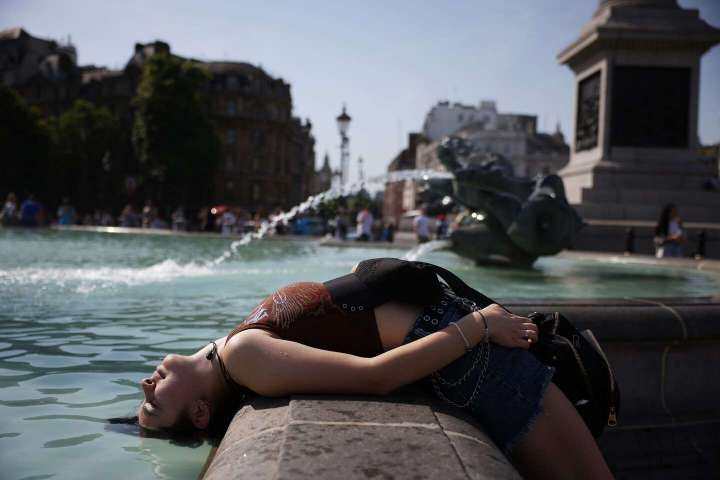Melissa Harrison writes a monthly Nature Notebook column in the Times of London, and is the author of “Rain: Four Walks in English Weather.”
Living through the British heat wave was unbearable. We can’t downplay it.

Forecasters had been warning for days of a plume of heat traveling across Europe that was set to reach us on July 18. The Meteorological Office issued its first red “extreme heat” warning for most of England and the U.K. Health Security Agency put out its first Level 4 heat-health alert, meaning danger to life — particularly in cities, including London, Manchester and York.
Even so, when the heat wave hit, it felt shocking and stupefying; not just a few degrees hotter than we’re used to, but a whole new order of things.
Now, we must come to terms with the fact that a heat wave is no longer something to look forward to, but something to fear, and which we must now learn to survive. British Twitter is awash with tips about closing and opening windows and freezing socks. Yet it goes without saying that we’re also bickering about how bad it is, with some sections of the media branding the furor as infantile and hysterical.
It’s a difficult about-face for a sun-loving nation weaned on nostalgia for the “glorious summer of ’76,” where forecasts still talk of rain as “bad weather” and tell us where “the best of the sunshine” might be found. Despite everything we know about the climate breakdown, we won’t be able to change the meaning of a heat wave from good to bad overnight.
I live in East Anglia, England’s breadbasket but also the area with the lowest rainfall and highest levels of water stress. At first, the air was motionless as the sun blazed mercilessly from a hard blue sky, baking the wheat and barley fields, and visibly wilting the leaves on the trees; then a hot wind picked up, like the blast of air from a fan oven when the door is opened.
During daylight hours, I sheltered in place, the rural village I live in newly inimical and unfamiliar; at night my bedroom remained at around 29 degrees Celsius (84 degrees Fahrenheit). Forty was breached by day, as had been predicted; not far away, a wheat field, tinder-dry, caught fire and burned. Worse, devastating wildfires destroyed homes around the capital, where the London Fire Brigade had its busiest day since World War II and the mayor, Sadiq Khan, pleaded with people not to light barbecues. The landing strip at Luton Airport, 28 miles north of London, warped and lifted up, and railways saw major disruptions after some steel rails buckled; the rails are stress-tested for heat — but not heat this extreme.
Covid-19 levels are high here at the moment, with estimates of one in 18 currently infected; emergency services, already under pressure, felt the strain, with every ambulance trust in England declaring a critical emergency. The government’s civil contingencies committee, known as COBRA, was convened; British Prime Minister Boris Johnson chose not to attend and went to an air show instead, where he got a fun ride in a plane. Meanwhile, activists with the Extinction Rebellion environmental movement smashed windows at the London headquarters of Rupert Murdoch’s news empire to protest tabloid coverage that painted the heat as a good thing and failed to link it to climate change.
I don’t condone it, but I can understand the attraction to that kind of coverage as a way to minimize what’s happening. Living through what we’re living through — seeing it take hold, and not knowing where it will end — isn’t just terrifying, it’s unbearable; turning away from something so overwhelming is an entirely human response. Stopping yourself takes practice, and if you believe the result will be only fear and helplessness, rather than the galvanizing energy many of us feel, it’s not exactly a rewarding habit to put in place.
And there’s something else to the denial many of us feel. I suspect the trauma of recent years — Brexit, the pandemic, the war in Ukraine, your previous president, our near-constant political chaos and a worsening cost of living crisis — has weakened our emotional resilience. There’s a childish part of me that, despite everything I know, would also like to buy a lolly and enjoy the heat wave as a positive collective experience. God only knows that’s something we need.
In my garden, sparrows shelter in the hedge, their beaks agape; there’s a faint smell of smoke on the breeze. Two hundred miles west, rain falls on a friend’s skylight and, excited, she sends me a picture. Within minutes it’s evaporated, and the sun beats down again.






